Introduction
Nigerian attorneys play a vital role in the country’s legal system and society. Social justice is crucial for equality and fairness in Nigerian communities.
Brief Overview of Nigerian Attorneys
- Legal Advocates: Nigerian attorneys navigate complex laws to represent clients, ensuring fair treatment.
- Diverse Roles: From criminal defense to corporate law, they serve in various legal domains.
Importance of Social Justice
- Equality: Attorneys fight for equal rights, challenging discrimination and advocating for marginalized groups.
- Legal Reform: They address systemic issues, promoting changes in laws for a just society.
- Access to Justice: Attorneys bridge gaps, enabling even the underserved to seek legal redress.
- Voice for the Voiceless: Advocating for those who can’t speak up empowers the marginalized.
Nigerian attorneys hold the key to social justice, using their legal prowess to ensure fairness and equality.
Background of Nigerian Attorneys
Overview of the legal system in Nigeria
- The legal system in Nigeria is based on English common law.
- It is a federal system, with a dual system of courts at the federal and state levels.
- The Nigerian legal system is a blend of traditional customary law and the English legal system.
- The Nigerian Constitution is the supreme law of the land and provides for the separation of powers.
Read: The Evolution and History of Legal Professions in Nigeria
Role and responsibilities of Nigerian attorneys
- Nigerian attorneys, also known as lawyers or advocates, play a crucial role in the administration of justice.
- They are responsible for providing legal advice, representing clients in court, and drafting legal documents.
- Nigerian attorneys have a duty to uphold the rule of law, defend the rights of their clients, and promote justice.
- They are officers of the court and must abide by the ethical rules and professional standards set by the Nigerian Bar Association.
Challenges faced by Nigerian attorneys in pursuing social justice
- Limited access to justice: Many Nigerians, especially those in rural areas, lack access to legal services due to financial constraints.
- Corruption: The Nigerian legal system is plagued by corruption, which hinders the pursuit of social justice.
- Inefficient judicial system: The backlog of cases and delays in court proceedings often hinder the timely delivery of justice.
- Inadequate funding: The Nigerian government’s allocation to the judiciary is often insufficient, leading to a lack of resources for attorneys to adequately represent their clients.
- Political interference: Nigerian attorneys sometimes face political pressure or intimidation when representing clients in politically sensitive cases.
- Cultural and gender biases: Societal norms and biases can negatively impact the pursuit of social justice, particularly for marginalized individuals and groups.
- Insufficient legal education and training: Some Nigerian attorneys lack adequate training and skills needed to handle complex social justice issues.
In short, Nigerian attorneys play a vital role in the pursuit of social justice in Nigeria. However, they face numerous challenges that hinder their effectiveness.
Addressing these challenges, such as improving access to justice, combating corruption, and enhancing legal education, is crucial to ensure a fair and just legal system in Nigeria.
By overcoming these obstacles, Nigerian attorneys can better serve their clients and contribute to building a more equitable society.
Read: Salary and Compensation: Nigerian Attorneys Explained
Analysis of Nigerian Attorneys and Social Justice
Discussion on the impact of corruption on social justice
Corruption within the Nigerian legal system poses a significant threat to social justice. It undermines the rule of law, creates an uneven playing field, and perpetuates inequality.
- Corruption erodes public trust in the judiciary, making it difficult for citizens to believe in the fairness and impartiality of legal processes.
- Bribery and illicit practices hinder the proper functioning of the justice system, denying disadvantaged individuals equal access to justice.
- The prevalence of corruption leads to the violation of human rights, as the rights of marginalized groups are often ignored or violated due to bribery and favoritism.
- Social justice requires a transparent and accountable legal system, which cannot be achieved in the face of widespread corruption.
Analysis of the influence of political affiliations on attorneys
The political affiliations of Nigerian attorneys can heavily impact their pursuit of social justice.
- Political connections often lead to preferential treatment and influence over legal decisions, overshadowing the principles of justice and fairness.
- Lawyers aligned with powerful politicians may manipulate the legal system to their advantage, compromising the rights of the less privileged.
- Political interference can obstruct the independence of attorneys, hindering their ability to advocate for social justice and protect the rights of ordinary citizens.
- The pursuit of personal or political gain may divert attorneys’ attention from their duty to serve the interests of justice and equality.
Examination of the role of money and resources in accessing justice
In Nigeria, economic disparities play a crucial role in determining who has access to justice.
- The high cost of legal representation and court fees creates a barrier for those without financial means, exacerbating social inequality.
- Wealthy individuals can afford skilled attorneys and manipulate the legal system to their advantage, while the poor are left marginalized.
- Insufficient legal aid services further hinder the ability of marginalized individuals to access justice and defend their rights.
- Adequate funding and resources for legal institutions are essential to ensure equal access to justice, regardless of one’s socioeconomic status.
Read: Contribution of Nigerian Attorneys in International Law

Critique of Nigerian Attorneys’ Engagement in Social Justice
Analysis of the effectiveness of Nigerian attorneys in advocating for social justice
- The lack of adequate resources and infrastructure hampers the impact of Nigerian attorneys on social justice causes.
- Corruption within the legal system undermines the efforts of Nigerian attorneys to achieve social justice.
- Limited access to justice for marginalized communities further restricts the effectiveness of Nigerian attorneys.
- Insufficient legal aid and pro bono services hinder the capacity of Nigerian attorneys to address social justice issues.
Evaluation of their commitment to upholding human rights
- Nigerian attorneys have demonstrated a strong commitment to the protection and promotion of human rights.
- They file lawsuits and engage in public interest litigation to hold individuals and institutions accountable for human rights abuses.
- Nigerian attorneys actively participate in international human rights conferences and collaborate with global organizations.
- Their efforts contribute to the advancement of human rights in Nigeria and the African continent as a whole.
Criticism of Nigerian Attorneys’ Involvement in high-profile Cases Instead of Prioritizing Broader Social Justice Issues
- Nigerian attorneys often focus on high-profile cases that bring them personal recognition and financial gains.
- The spotlight on these cases overshadows systemic social justice challenges faced by the majority of Nigerians.
- This selective approach neglects the urgent need for widespread advocacy and reform within the legal system.
- Nigerian attorneys should balance their involvement in high-profile cases with a broader commitment to social justice causes.
In essence, while Nigerian attorneys display dedication to advocating for social justice and upholding human rights, there are inherent challenges that limit their effectiveness.
Insufficient resources, corruption, and limited access to justice hinder their impact in addressing social justice issues.
Additionally, the focus on high-profile cases often overshadows the broader social justice challenges faced by marginalized communities.
Nigerian attorneys should strive for a more comprehensive and inclusive approach that prioritizes systemic change and addresses the root causes of social injustice.
Only through collective efforts can Nigerian attorneys truly contribute to a more just and equitable society.
Read: Work-Life Balance for Attorneys in Nigeria: A Study
Uncover the Details: Steps to Becoming a Certified Paralegal in Nigeria
See Related Content: Understanding the Bar and Bench Relationship in Nigeria
Find Out More: Role of a Lawyer in the Fight Against Corruption in Nigeria
Suggestions for Improving Nigerian Attorneys’ Influence on Social Justice
Recommendations for strengthening ethical standards within the legal profession
- Implement stricter codes of conduct to ensure ethical behavior among Nigerian attorneys.
- Establish an independent body to monitor and enforce ethical standards within the legal profession.
- Provide ongoing ethical training and education programs for attorneys to enhance their understanding of ethics.
- Create a whistleblowing mechanism to encourage reporting of unethical practices within the legal profession.
- Promote transparency and accountability in legal proceedings to uphold ethical standards.
Suggestion for increased collaboration among Nigerian attorneys and civil society organizations
- Promote networking events and forums to facilitate interaction between attorneys and civil society organizations.
- Develop partnerships and joint initiatives between attorneys and civil society organizations to address social justice issues.
- Create an online platform where attorneys and civil society organizations can share resources and exchange information.
- Organize workshops and training programs to enhance the understanding of attorneys about the work of civil society organizations.
- Encourage attorneys to provide pro bono services to civil society organizations working on social justice causes.
Proposal for enhancing legal education to empower attorneys in promoting social justice
- Revise the legal curriculum to include courses that specifically focus on social justice issues and their legal implications.
- Introduce practical training programs that expose law students to real-life social justice cases.
- Incorporate experiential learning opportunities, such as internships, in organizations working on social justice.
- Provide scholarships and financial aid to students pursuing legal education with a focus on social justice.
- Invite guest lecturers, including experienced attorneys, to discuss social justice issues and their role in legal advocacy.
By implementing these suggestions, Nigerian attorneys can significantly enhance their influence on social justice matters.
Strengthening ethical standards will ensure that attorneys operate with integrity and uphold justice.
Increased collaboration with civil society organizations can amplify the impact of their efforts.
Furthermore, enhancing legal education empowers attorneys with knowledge and skills.
This equips them to effectively advocate for social justice in Nigeria.
It is through collective action and continuous improvement that Nigerian attorneys can truly make a significant difference in society.
Read: Legal Challenges Faced by Attorneys in Nigeria
Conclusion
Nigerian attorneys play a crucial role in achieving social justice by advocating for the oppressed.
It is essential for individuals and organizations to support Nigerian attorneys in their pursuit of social justice.
By standing alongside these dedicated legal professionals, we can work towards a more equitable and just Nigerian society.
Recap of Importance of Nigerian Attorneys
- Rights Guardians: Attorneys uphold justice, protecting citizens’ rights against injustice and oppression.
- Equality Advocates: They challenge inequality, driving systemic changes for a fair society.
Call to Action for Support
- Awareness: Educate about attorneys’ role in social justice for a better-informed society.
- Resources: Provide funding and resources to organizations working on legal reforms.
- Collaboration: Partner with attorneys to amplify the impact of social justice initiatives.
Supporting Nigerian attorneys is pivotal for a just society. Let’s join hands to strengthen their endeavors for social justice.




